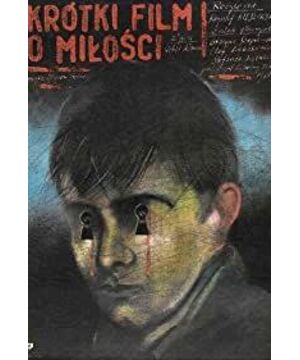What kind of person is Kiesnovsky? What do you have to think about in your mind to make "Love Short Film", "Twin Flowers", "Red White Blue"?
Before watching the "Love Short Film", I have seen the introduction of the film, and I am deeply impressed with the love that was never obtained and hurt. I don't want to call Tomek a voyeur, although he is. But this kind of originally "dirty" thing is connected with love, and the lines suddenly become much softer. The same is true in "Tie Me, Tie Me". What is love anyway? There is a dialogue in the film, after Magda learns that Tomek is spying on her. She asked: "Why do you do this? Want to kiss me? Want to have sex with me? Or do you want to travel with me?" But he replied, "No." Then he ran away quickly, and the camera followed him to the roof. He took a piece of ice and put it on his face, trying to calm himself down, then the camera changed, and Tomek returned to Magda’s house and asked: "Can I buy you ice cream?" This scene marked Tomek. Begin to walk out of the position of the peeper, and begin to learn to be in the same space as Magda. But don’t forget, in the film, he said to her: “Because I love you.” She subconsciously said: “No, it’s nothing like that.” Obviously, Magda doesn’t believe in love. Obviously, there is more More and more people do not believe in love like her. When I was a teenager, I didn't believe that love is the same as hurt. But now I believe. What is hurt if there is love? It exists, the fault lies with us, and we have added too many things to it that hurt it. This makes love blurred, and it also makes us feel that the "love" around us has suddenly increased. Sometimes even think that love is companionship. A very cute friend of mine thinks that it is good to have love, because two people can sleep together. She is afraid of ghosts and dare not go to bed alone. I used to know someone who was good, or he felt good about himself. I'm a future war reporter. I hope to find someone who cares about me to get married, so that someone can greet me when I'm outside in the future. This person is unusually realistic and calm, and he autonomously filters out all the problems that may arise from love, and directly equates love with caring. At the same time, he also discarded the purity and joyful hope that love brought. In fact, friends and family can do this kind of thing, so why bother with love? There are people to get someone, for sex, which is even more ridiculous. Love has no purpose, it is just a state, a state in which we can still feel hope in the pain. A more agreeable statement is: "It is a simple matter to love someone. It is like filling a glass with a glass of water and drinking it coolly... It is not a tool to satisfy your selfish and arrogant heart. It is not a weapon used to fight against the essence of nothingness... When it already exists, it has already lost the so-called result." (Anne Baby, "Awareness Period"). This Something like "Loving you is just my personal business" in "A Letter from a Stranger Woman", she did a good job. If he needs it, she will come, if he doesn't need it, she will leave. He even ran away to give birth to a child by himself, but still loved him. In 1900 in "The Pianist on the Sea", he finally gave up love because of the fear of the invisible nothingness. In the end, this fear made him give up on himself. But in another sense, this has to be said to be complete.
And what about Tomek? He loves Magda. So, he broke the window and stole the binoculars to spy on her; he turned the alarm clock on until half past eight, when Magda returned home, and Tomek began his real "life"; as a post office clerk, he gave her Sending the wrong notice just for her to come to the post office; detaining her letter privately, just detaining it, but not opening it; when Magda was about to make friends, she called a gas company employee and borrowed someone else to intervene in her. Life; to work as a milkman, just to knock on her door in the morning to have a look at her; and those anonymous calls... And when Tomek said it was not to kiss her, make love to her, or go on a trip with her , Do nothing, just because when she loved her, Magda showed a very confused and thoughtful look on her face, and then she still denied the existence of love. From the beginning, she restricted Tomaker's voyeurism to the scope of voyeurism, so when she picked up the phone, she would say, "You are a pervert". Let him roll when he learns of Tomek's peep, and his face is surprised and disgusted. What's more, she used one of her boyfriends to complete an erotic show specially prepared for Tomek. For this reason, she put the bed in a position where he could peek into, and told him on the phone: "Appreciate it." Is Meck really a voyeur? In the early part of the film, when Magda wanted to make friends with the man, Tomek quickly turned the binoculars away. Magda insisted on identifying Tomek as a nasty and voyeuristic pervert, and at the same time identifying herself as a lewd and exhibitionist woman. This was not enough. When Tomek said that she had a good memory, she forced him to remember the situation with those men. "When the men came to my room...tell me what I did..." This made her insist on denying the existence of love, and wanted Tomek to deny it, so that she would fall into a painful situation. She didn't want to Change the status quo, and don't want to accept salvation like "love". She regarded Tomek as any man who wanted to approach her, thinking that he had a certain purpose just like those men. So when they came out of the coffee shop, Magda pointed to the bus parked in front of him and said to Tomek, "That's the car we went back to. If we can catch up, we will go to my house." When they ran closer, The car closed the door and slowly drove away. At this time, the camera gave a middle shot, and the bus came to a halt slowly. This is reminiscent of Kiesnovsky's "Blind Hit". If the bus did not stop, what would happen to Tomek and Magda? I don't know if Tomek will complete his coming-of-age ceremony in such painful and desperate way, or if Magda will adopt a slightly compassionate approach. When Tomek entered Magda’s house, he was as excited and joyful as a child, although from the telescope, he was already He was very familiar with her home, and even knew where she and those men were performing their "drama". His peeping into her was so detailed that one time he secretly gave her a key that could open the wall clock on her house. Before, when Magda agreed to his invitation to "please eat ice cream", he was happily pulling the milk cart and spinning quickly on the road. This warmth is fleeting. At this time, Magda walked out of the bath, walked to Tomek, took Tomek's hand, and slowly touched it along her legs. The camera was pushed into a close-up shot of Tomek's hands. The hands were trembling and hesitant. Then the camera was turned into a close-up of Tomek's face, a distorted, painful, and nervous face. Finally, Tomek lowered his head and shed Tears. This incompetence made him complete the difficult growth, and then Magda calmly and coldly said: "This is all about love." Then Tomek pushed Magda away and ran out. This incident directly led to Tomek’s suicide and completely reversed the narrative: he became a peeper, and Magda became a peeper.
After Tomek ran out, Magda began to regret it. She repeatedly raised the phone receiver in front of the window. When she did this before, Tomek would call her; she wrote an apology on the back of the oil painting she had been creating. It was posted on the window, hoping he could see it; she even found a children's binoculars out of the cabinet, wanting to see Tomek, but the other side was dark. When she finally couldn't help but knocked on the door of Tomek's house using returning the coat as an excuse, Tomek's friend, Mahsin's mother, told her very unkindly that he was in the hospital. And refused to tell her the reason, because "He may love the wrong person... That reason, people like you will find it funny." Mahsin's mother has always lived with Tomek and has been taking care of him. She looked at Tomek with a meaningful gaze, which made me doubt the abnormal emotions of the maternal lover. She also knew Tomek’s peeping of Magda, and when Tomek was at Magda’s house, she also Peeping at them. In the early part of the film, she tried to prevent Tomek from peeping at Magda, telling him that Miss Poland campaign was being shown on TV, and asked him to come out to watch it, but in the end it was still in vain. Tomek only watched for a while before returning. Room. Her dislike of Magda really came from the protection of Tomek? Or a kind of jealousy.
Magda was actually in Love Tomek at this time, and she began to "copy" what Tomek had done to her before: peeping at his home with a binoculars, although the light on the opposite side did not shine for a long time; Called Tomek’s name on the anonymous phone, and it was later confirmed that it was just a phone call from a friend who had a problem with the signal; she closed the curtains and turned down a certain boyfriend...she even ran to the post office to see if he was there. At work, or happily thinking that it was him who delivered the milk, all he saw was the cold face of Mahesin’s mother. When she heard that Tomek committed suicide because of love, she finally thought that Tomek was right and that there was love. She sat down weakly along the door frame, her body forming a hopeless silhouette in the backlight. It is said that this is a classic scene, and the name is: the woman who hopes to return. Tomek returned from the hospital, but what he did was close the curtains to prevent his peeping and at the same time seal his heart. He will take over the position of Magda and no longer believe in the existence of love.
At the end of the film, Kiesnovsky showed us a hopeful scene through Magda’s imagination in front of Tomek’s telescope: Magda, who was once lonely, stopped crying and put her head at ease. Leaning on the once lonely Tomek's hand. In fact?
I heard that there are two types of film, oil-soluble and water-soluble. The oil-soluble film has a strong sense of color, while the water-soluble film has a strong sense of layering. Kiesnovsky usually uses water-soluble film, and this film is also. He used such a firm and hopeful way to lead us to reality.
View more about A Short Film About Love reviews








